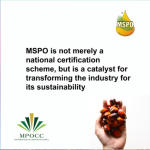Iceland, Palm Oil and Empty PR Stunts
Richard Walker, MD of Iceland Foods, is a man on a mission to save the world’s rainforests.
You can bet he felt really pleased with himself when his decision to ban the use of palm oil in Iceland’s own brands attracted a flurry of publicity a couple of weeks ago.
Since then, people have had a chance to reflect on Richard Walker’s claim that his decision was just the latest manifestation of Iceland’s somewhat inconsistent understanding of Corporate Social Responsibility. I don’t want to be rude, but having now read all Iceland’s PR blurb about this, alongside a very wide range of commentaries from other people, I can’t help but feel that this is an almost entirely meaningless gesture.
Walker claims to be doing this to help stop deforestation in South East Asia and other palm oil countries. Really?
I hate to disabuse him on this score (and no doubt quite a few all-too-gullible greenies as well), but palm oil is not the principal source of deforestation in those countries. It might well once have been, but it isn’t now.
On a global basis, clearing forest either for grazing livestock, or for growing the feed that livestock needs, is a far more serious problem than conversion of forest for oil palm – up to ten times more serious, according to some estimates.
So I wonder if Richard Walker’s next move will be to eliminate the use of all beef products in Iceland’s own brands? That would at least be a completely consistent decision.
Iceland purchases around 500 tonnes of palm oil a year for use in its own brands. According to the Malaysian industry, this represents precisely 0.001% of annual global production.
Insignificant though that volume is, Iceland will have to source alternative oils to replace the palm oil – most likely a combination of sunflower oil, rapeseed oil and possibly soybean oil. Walker clearly imagines that these products come with a clean bill of health, but, as I went to some lengths to explain in the work that we did for the High Carbon Stock Science Study, substituting palm oil with those alternatives would have the gravest consequences for land use around the world – simply because you can get so much more oil palm per hectare than with any of its competitors.
Most damagingly of all, Richard Walker declares that he thinks it is impossible to distinguish between sustainable palm oil and unsustainable palm oil. “We don’t believe there is such a thing as ‘sustainable’ palm oil available to retailers.”
What an ignorant, intellectually lazy position that is, belittling more than a decade’s worth of effort by governments, academics, NGOs and the companies themselves to determine appropriate criteria for managing palm oil plantations in genuinely sustainable ways.
Most retailers in Europe and the US remain committed to that process, through the Roundtable on Sustainable Palm Oil, intent on buying certified product so they can in turn reassure their customers. What makes Richard Walker (with his measly 2% of the retail market in the UK) so contemptuous of all his competitors that he believes their judgement on the value of certification is worthless?
The response to all this from the industry in Indonesia and Malaysia has been pretty irate, accusing Richard Walker of salving his conscience at the expense of the hundreds of thousands of employees in their companies. Personally, I’m not sure it’s got anything to do with his conscience. It’s much more likely to be a somewhat cynical PR stunt.
Sir Jonathon Porritt
Founder Director
Source : www.jonathonporritt.com










Leave a Reply